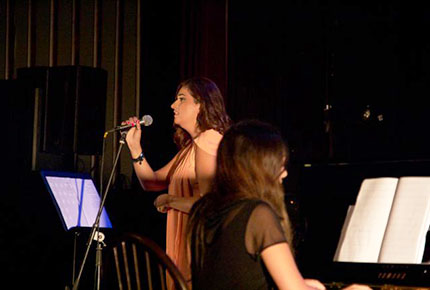An LAU gem hidden in plain sight
While some have been encouraging her for years, others may just be discovering LAU Lead Intermediate Accountant Maya Hobeika as a best-selling Lebanese singer.

Mastering classical western techniques allow her to focus on her body and have control over it while singing, but Hobeika naturally lets her emotions rise by bringing the tarab into it.
LAU might not know it, but in many ways it helped produce a best selling Lebanese music album. The person behind that album is not to be found in the Communication Arts Department or even strumming a guitar on the Fine Arts stairs. Follow the beautiful soprano voice and you’ll end up on the third floor of Irwin Hall, in the Comptroller’s Office, at the desk of Lead Intermediate Accountant and best-selling Lebanese singer Maya Hobeika.
“I come from LAU, I belong to this place,” says Hobeika. “I’ve spent so much time here, first as a student, then as an alumna, and now as a staff and choir member. It makes me happy that people here are starting to become familiar with my work.”
Hobeika, an accomplished singer, studied business at LAU, but has a very hands-off relationship with the market. To begin with, she doesn’t want to be ruled by it. “My job at LAU protects me from the pressures of the market. I don’t have to perform in pubs or restaurants to make a living. I don’t have to sign with a production house and agree to their terms. It gives me the power to choose the music projects I want to do,” she says.
Her first album Ward (the Arabic word for “rose”) was a totally independent release, with none of the marketing support that other artists get. “I worked on it with my brother Jad Hbeika, a composer, who is also an LAU alumnus and who taught here,” she says proudly. Justifiably so - Ward hit the bestseller list at Virgin and stayed there for over four months while getting lots of radio play.
The album is very much a product of her extraordinary enthusiasm and years of work. Her dedication encompasses juggling a day job with spending evenings and weekends learning new material, recording critically acclaimed music and managing her concerts. Three times a week, Hobeika also attends oud classes at the National Music Conservatory. For the last few years, while her coworkers have been taking lunch breaks, Hobeika has been going to LAU choir director Leila Dabaghi’s classroom for private classical singing practice. She has also been going there for lessons after class. Moreover, as of 2002, she has been singing in the LAU choir. Speaking of Dabaghi, Hobeika says fondly “LAU gave me the best opportunity I could wish for- the perfect teacher. Its hard to find a teacher who understands exactly what you want.”
Her bi-cultural training is also creating a unique and hybrid sound. “My music is building bridges between waltz, tango and Oriental music,” Hobeika says adding, “Critics have called it a very original sound and for me that’s proof that my brother and I are on the right track, working properly and respecting the traditions of the musical styles.”
Mastering classical western techniques allow her to focus on her body and have control over it while singing, but Hobeika naturally lets her emotions rise by bringing the tarab into it. “This is something emotional inside you, something no one can teach you.”
In tune with Hobeika, the LAU community has been supportive on and off campus. “There is no better audience!” she says.
To stay up-to-date on Maya Hobeika’s news like her Facebook page.
More
Latest Stories
- LAU Simulation Models Celebrate 20 Years of Learning, Leadership and Service
- LAU Stands Out on the Sustainability Scores
- Michael Haddad Walks Again for Climate Change and Food Security
- AI in Clinical Practice: Tools, Ethics, and the Human Touch
- Interior Design Students Honor the Past by Designing the Future
- LAU’s 100th Commencement Continues With Beirut Class of 2025
- Wadad Halwani: Mourning, Memory and Movement
- LAU’s 100th Commencement Begins With Byblos Class of 2025


